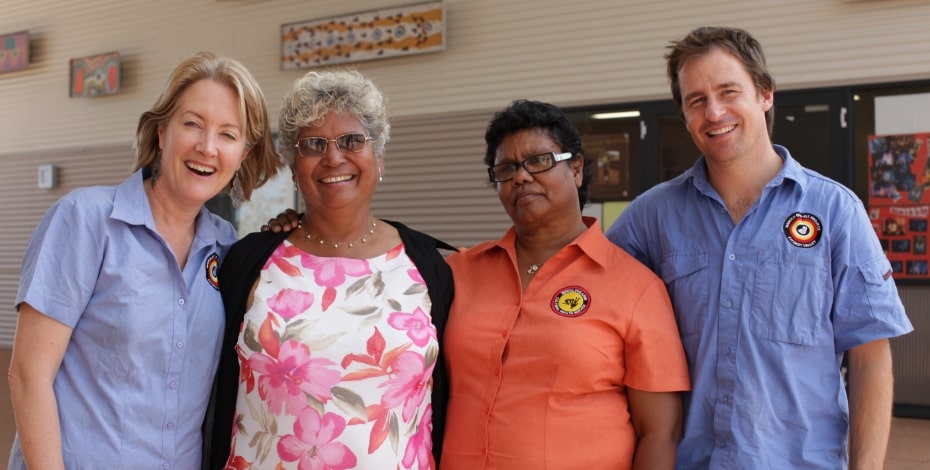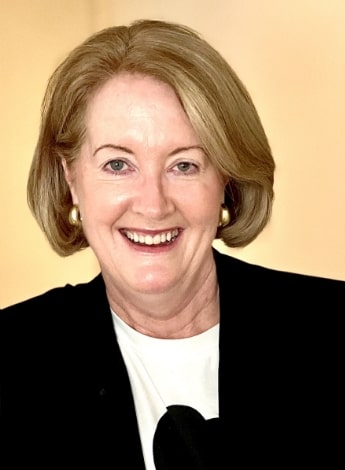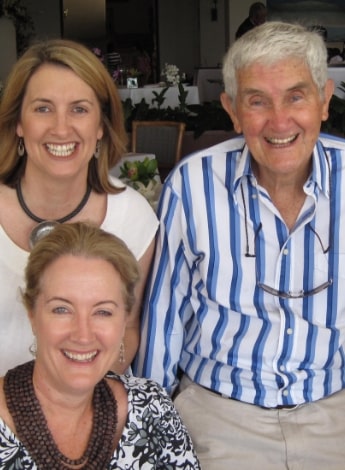
Sisterhood with the travelling plans

Jane Latimer AO has been recognised internationally for her research into low back pain and Aboriginal and Torres Strait Islander health and for her powerful leadership and advocacy for women.
As we mark International Women’s Day and National Close the Gap Day this month, Jane speaks about her career and achievements and her strong familial ties.
When her identical twin sister Elizabeth Broderick became Australia’s Sex Discrimination Commissioner in 2007, physiotherapist Dr Jane Latimer was working at the George Institute for Global Health, deeply involved in health research.
Elizabeth began travelling around Australia to meet different groups of women to help inform her work agenda, arriving at Fitzroy Crossing in the north of Western Australia to hear about the incredible work that local Aboriginal women including June Oscar and Emily Carter were doing in their community to combat foetal alcohol spectrum disorder.
It was Easter and Jane decided to use the break to fly from her home in Hunters Hill, New South Wales to meet Elizabeth and cast a physiotherapy lens over the work being done in the Kimberley.
‘I met Liz up in Darwin and we were talking about it and we said, “What’s one thing we could do to help June and Emily?”
'We didn’t know many First Nations people; we hadn’t met that many.
'Then we said, “Well, why don’t we make a film with them about what’s happening here and why don’t we share it with our colleagues and friends in Sydney and then take it to the United Nations, to the Commission on the Status of Women, which Liz would be at, and screen the film to show the world what these inspirational women are doing?”’ Jane says.
The sisters, who had no prior experience of filmmaking, secured a generous donor to back the ambitious project and convinced film director Melanie Hogan and a film crew to sign on.
For three weeks Jane and the film crew lived in the Kimberley region with June and Emily and the Fitzroy Crossing Aboriginal community, faithfully recording their stories in the hope of working with the community to look for solutions.
‘We filmed Yajilarra, which means “to dream” in the language of the Bunuba people, but it was their dream of a better future for their children,’ Jane says.
‘It was a very powerful Aboriginal voice talking about the impact of alcohol and about the fact that so many people didn’t fully understand the harm that alcohol could cause to the next generation.’
The sisters sourced more funding so that Aboriginal Elders June and Emily could fly to New York for a session at the United
Nations Headquarters for the Commission on the Status of Women, hosted by the Australian Government, during which Yajilarra was screened.
For June Oscar and Emily Carter, the trip was the first time they had ever set foot off Australian soil.

Jane Latimer.
After the screening, the women shared their experiences of alcohol in Aboriginal communities and the devastating impact it
was having on children with the international dignitaries.
It was a profoundly moving experience for Jane that she describes as one of the highlights of her career.
‘It was amazing to see the power of film in raising the visibility of those women and how they could, from grassroots to the UN, change women’s policy around the world.
'We then got significant funding from the government and others to do the first study on the prevalence of foetal alcohol spectrum disorder in remote communities, predominantly Aboriginal communities. That went on for about six or seven years.
'It was amazing but hard work and we travelled thousands of kilometres across the Kimberley,’ Jane says.
‘The Aboriginal leaders in the Fitzroy Valley led the work and we came in behind, providing the research skills and attracting the funding and doing other things that were more difficult for them.
'I think that’s why there was such great participation in the prevalence study.
'We really needed to get the whole population behind it and more than 90 per cent of people agreed to participate in the study, which is a remarkable number.
‘Those Aboriginal leaders were so generous in helping us understand this incredibly ancient culture but also the Aboriginal ways of knowing.
'It was a meeting of our Anglo-Celtic Western culture and their Aboriginal culture, walking together to do this for the children.
'It was a true collaboration, where people were equal partners, although they were leading the work.
'It was something that they wanted; it wasn’t something we’d designed down in our research institute in Sydney and decided would be a good idea to run in north Kimberley.
‘We demonstrated that they had one of the highest prevalences of foetal alcohol spectrum disorder in the world in the remote communities but it was not something that was talked about.
'By revealing that hard truth of what was happening in the community, they could lobby for far more funding, do some future planning for how the schooling should look and determine what support services the community would need and how they could improve the lives of these affected children.
'That was a wonderful thing.’
Jane is no stranger to research, having spent much of her career conducting high-quality clinical trials to identify the most effective treatments for low back pain.
The trials have been some of the most challenging and influential in the field, including placebo-controlled trials of surgery and trials of opioid medication where there is significant potential for harm.
She has received more than $22 million to fund her work and has published in the world’s leading medical journals, including The New England Journal of Medicine, The Lancet and Nature.
Jane comes from a family of health practitioners—her mother was a physiotherapist and her father was a doctor.
After flipping a coin with Elizabeth, who chose to study law, Jane studied physiotherapy at the Cumberland College of Health Sciences in Sydney in 1979, going on to undertake an internship at Sydney Hospital.
‘I loved that there was such a varied case load and it reaffirmed that I’d chosen the right career.
'I was always interested in musculoskeletal disease and the treatment of orthopaedic injuries but also back and spinal pain.
'At the time, Geoffrey Maitland was one of the key opinion leaders in the world and he was talking about ways of treating people with back pain that hadn’t been thought of before.
'In my course, we had wonderful teachers who were highly skilled in the Maitland methods and I think that really piqued my interest as well.’
Missing academia, Jane decided to go back to university to undertake a graduate diploma in manipulative physiotherapy
in 1989, finding lifelong friends in physiotherapy stalwarts such as Chris Maher along the way.

Jane Latimer (bottom left) and her younger sister Carolyn and father Frank Broderick.
Jane’s interest in spinal pain and in the diagnosis, treatment and prognosis of patients with back pain grew, along with her awareness of the importance of research in this field.
Jane undertook her PhD part-time at the University of Sydney between 1991 and 1997.
She worked on developing the first mechanical device to measure stiffness and investigated whether we could use that device to train physiotherapists to be more accurate in their judgement of spinal stiffness, while also raising a family and caring for her sick mother.
The ability to study part-time was an opportunity that Jane has always valued highly.
‘Publishing the work and getting the PhD by publication showed me how important research was, that you could have an impact in the research field and still have a role as a mother and a career,’ Jane says.
‘My career trajectory has really followed the life cycle of a woman, I think. The part-time PhD enabled me to combine work and care rather than having to make a hard choice between the two.’
Jane briefly returned to clinical practice— working in Macquarie Street with Dale Larsen, who ran a private practice—before taking on full-time research in the area of spinal pain with a team of researchers at the Institute for Musculoskeletal Health.
After a long and happy stint at the Faculty of Health Sciences in Lidcombe, Jane and the team, including Rob Herbert, Cathie Sherrington and Chris Maher, wanted to do bigger clinical trials.
This meant moving to an organisation with a bigger clinical trial environment—the George Institute for Global Health.
‘It was a fabulous place to work because it didn’t have the same sort of bureaucracy or hierarchy as the university and they understood the clinical trial environment very well and were global in their reach, in India and China.
'It allowed us to attract PhD students from across the world.
'We brought in young, emerging talent from Brazil and Ireland along with the Marie Curie Fellows from the US and from England and they brought new ideas and new ways of thinking with them.
'They challenged a lot of what we’d thought about manual therapy and manipulation and ways of measuring outcomes in back pain.’
Jane became the founding deputy director of the Institute for Musculoskeletal Health at the University of Sydney in 2017, a position she held until 2022.
She also worked as director of strategy for Elizabeth Broderick and Co, an organisation started by her sister that focused on gender equality and cultural change.
In this role Jane was a key adviser to Elizabeth across her portfolios of United Nations Special Rapporteur and Independent Expert on the Working Group on discrimination against women and girls and founder and convenor of the Champions of Change Coalition, a globally recognised not-for-profit organisation for achieving gender equality.
‘When Liz stepped away from the role of Sex Discrimination Commissioner in about 2015 and started her own organisation, I began to help her on a part-time basis.
'I particularly loved the work she was doing; I had noticed what a struggle it was for talented young women to accelerate their careers within the university and the research environment.
‘I could see simple, practical actions that could be taken in the university environment or in the STEM (science, technology, engineering and mathematics) research environment and used to accelerate and increase the visibility of the amazing women there.
'I helped the university with the SAGE initiative [Science in Australia Gender Equity] and I helped the Australian Academy of Science with some of their STEM initiatives.
'Then Liz got the role of United Nations Special Rapporteur for discrimination against women and girls and I assisted her in that role in a variety of different ways.’
Although she has now retired, Jane continues to follow her passion to be a driving force for positive change in the world.
She is also supporting her younger sister Carolyn, a sports physician who will be the first female medical director of the Australian
Olympic team in the 2024 Paris Summer Olympics in July and August this year.
‘The three of us are pretty tight; we all get together and we love working with each other when we get the opportunity,’ Jane says.
COURSE OF INTEREST: Introductory Women's Health Physiotherapy Level 1 here.
© Copyright 2024 by Australian Physiotherapy Association. All rights reserved.





